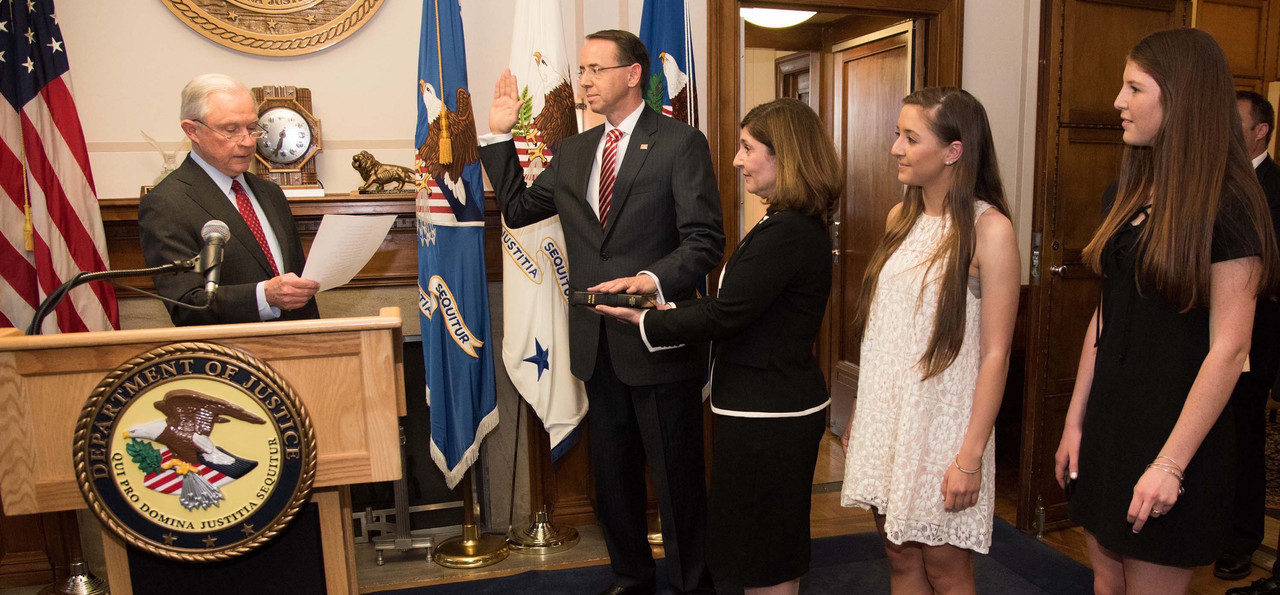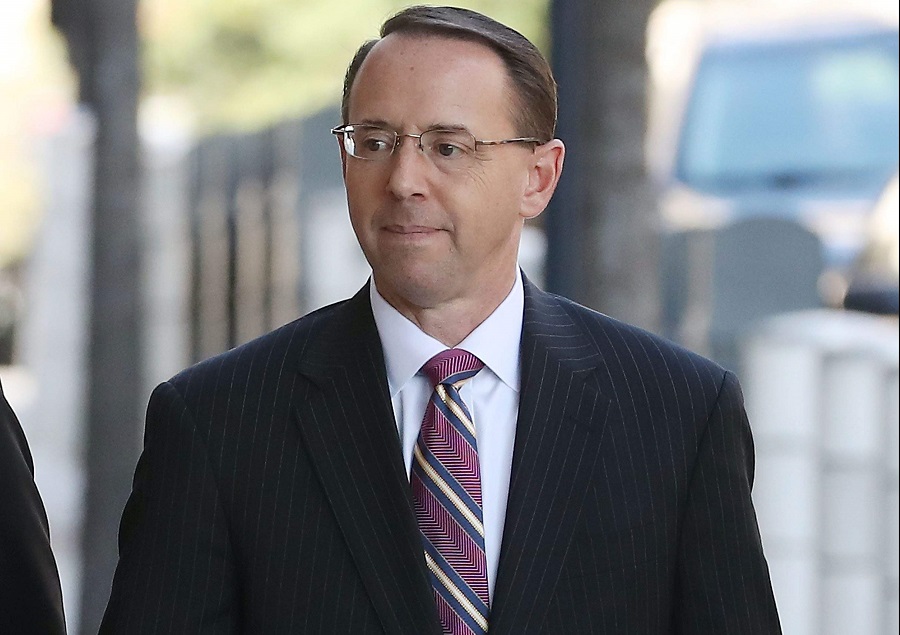Last updated on September 5th, 2018 at 12:47 pm
Rod J Rosenstein is the Deputy Attorney General of the United States who assumed office on April 26, 2017, as the successor of Sally Yates. Formerly, Rosenstein was US Attorney for the District of Maryland from 2005 to 2017. He is also the man behind firing James Comey from the office of Director of the FBI.
Early Life and Education
On January 13, 1965, Rod J Rosenstein was born in Philadelphia of Pennsylvania state. He received his high school education in the same place and joined the University of Pennsylvania Warton School for an undergraduate degree in economics. After Warton, he went to Harvard Law School for a Juris Doctorate degree.
Career

Graduating from Harvard Law School, Rod Rosenstein joined the US Court of Appeals for the District of Columbia Circuit. He worked in the office for a year as a law clerk and joined the US Department of Justice as a trial attorney. Serving in the position for three years, Rosenstein was appointed as Counsel to Deputy Attorney General for a year between 1993 and 1994. Then, he joined Jo Ann Harris as his special assistant for a year. Subsequently, Rosenstein was promoted to an associate independent counsel.
In 1997, Rosenstein joined US Attorney Lynne A. Battaglia’s team as an Asst. US Attorney and handled numerous litigations against credit card frauds and other criminal activities. To follow up, he became Principal Deputy Assistant Attorney General for Tax Division in 2001 and remained in the position until 2005. On July 12, 2005, under the nomination of George W Bush, Rod was officially appointed as US Attorney for the District of Maryland. He succeeded Thomas M. DiBiagio and served in the position until April 26, 2017.
A case was made on May 8, 2017, against FBI director James Comey in writing by Sessions and Rosenstein as President Donald Trump had directed them. Another day, a memo was handed by Rosenstein to Sessions which provided the basis for Session’s recommendation to President Donald Trump that Comey is dismissed. Rosenstein told on May 17, that he knew that Comey would be fired before he had written his controversial memo that the White House used as the justification for President Donald Trump for firing Comey. Rosenstein appointed Robert Mueller as a special counsel on the same day. Mueller’s task was to conduct the investigation into “any link or/and coordination between the Russian government. The other task was to conduct the investigation into individuals associated with the campaign of President Trump. Reportedly in April 2018, Rosenstein personally approved the FBI raid on President Donald Trump’s attorney, Michael Cohen. In the raid, the FBI seized emails, tax documents, and records. An article of impeachment was filled against Rosenstein on July 25, 2018, by Eleven House GOP members. They said that he had stonewalled document requests from Congress. They also said that he had mishandled the 2016 election investigation. However, Rosenstein denied these all. However, it was revealed that Devin Nunes wanted to do that against Rosenstein in order to protest Trump from Mueller.
Personal Life & Net worth
Rod Rosenstein is a married man. He is married to Lisa Barsoomian. She is an Armenian American lawyer who works for the National Institutes of Health. The couples have two daughters together. Rod Rosenstein lives in Bethesda, Maryland.
Rod Rosenstein’s estimated net worth is $1 million. As Rod Rosenstein is a Deputy Attorney General, he earns around $200 thousand per year.
Donald Trump and Rod J. Rosenstein
President Donald Trump appointed Rod as Deputy Attorney General on January 13, 2017. The hearing was conducted on April 25, 2017, which confirmed Rod for the post with 94-6 votes. Just about two weeks in the office, Rod already recommended President Donald Trump to fire FBI Director James Comey from the government position. Here’s the letter that Rod wrote in support of his recommendation: [Source: BBC News]
https://www.youtube.com/watch?v=J5hZkeFY9LQ
Memorandum for the Attorney General
FROM: Rod J Rosenstein
SUBJECT: Restoring public confidence in the FBI
The Federal Bureau of Investigation has long been regarded as our nation’s premier federal investigative agency. Over the past year, however, the FBI’s reputation and credibility have suffered substantial damage, and it has affected the entire Department of Justice. That is deeply troubling to many Department employees and veterans, legislators and citizens.
The current FBI Director is an articulate and persuasive speaker about leadership and the immutable principles of the Department of Justice. He deserves our appreciation for his public service. As you and I have discussed, however, I cannot defend the Director’s handling of the conclusion of the investigation of Secretary Clinton’s emails, and I do not understand his refusal to accept the nearly universal judgment that he was mistaken. Almost everyone agrees that the Director made serious mistakes; it is one of the few issues that unites people of diverse perspectives.
The director was wrong to usurp the Attorney General’s authority on July 5, 2016, and announce his conclusion that the case should be closed without prosecution. It is not the function of the Director to make such an announcement. At most, the Director should have said the FBI had completed its investigation and presented its findings to federal prosecutors. The Director now defends his decision by asserting that he believed Attorney General Loretta Lynch had a conflict. But the FBI Director is never empowered to supplant federal prosecutors and assume command of the Justice Department. There is a well-established process for other officials to step in when a conflict requires the recusal of the Attorney General. On July 5, however, the Director announced his own conclusions about the nation’s most sensitive criminal investigation, without the authorization of duly appointed Justice Department leaders.
Compounding the error, the Director ignored another longstanding principle: we do not hold press conferences to release derogatory information about the subject of a declined criminal investigation. Derogatory information sometimes is disclosed in the course of criminal investigations and prosecutions, but we never release it gratuitously. The Director laid out his version of the facts for the news media as if it were a closing argument, but without a trial. It is a textbook example of what federal prosecutors and agents are taught not to do.
In response to the skeptical question at a congressional hearing, the Director defended his remarks by saying that his “goal was to say what is true. What did we do, what did we find, what do we think about it.” But the goal of a federal criminal investigation is not to announce our thoughts at a press conference. The goal is to determine whether there is sufficient evidence to justify a federal criminal prosecution, then allow a federal prosecutor who exercises authority delegated by the Attorney General to make a prosecutorial decision, and then – if a prosecution is warranted – let the judge and jury determine the facts. We sometimes release information about closed investigations in appropriate ways, but the FBI does not do it sua sponte.
Concerning his letter to the Congress on October 28, 2016, the Director cast his decision as a choice between whether he would “speak” about the FBI’s decision to investigate the newly-discovered email messages or “conceal” it. “Conceal” is a loaded term that misstates the issue. When federal agents and prosecutors quietly open a criminal investigation, we are not concealing anything; we are simply following the longstanding policy that we refrain from publicizing non-public information. In that context, silence is not concealment.
My perspective on these issues is shared by former Attorneys General and Deputy Attorneys General from different eras and both political parties. Judge Laurence Silberman, who served as Deputy Attorneys General under President Ford, wrote that “it is not the bureau’s responsibility to opine on whether a matter should be prosecuted.” Silberman believes that the Director’s “Performance was so inappropriate for an FBI director that [he] doubt[s] the bureau will ever completely recover.” Jamie Gorelick, Deputy Attorney General under President George W. Bush, to opine that the Director had “chosen personally to restrike the balance between transparency and fairness, department from the department’s traditions.” They concluded that the Director violated his obligation to “preserve, protect and defend” the traditions of the Department and the FBI.
Former Attorney General Michael Mukasey, who served under President George W Bush, observed the Director “stepped way outside his job in disclosing the recommendation in that fashion” because the FBI director “doesn’t make that decision”. Alberto Gonzales, who also served as Attorneys General under President George W Bush, called the decision “an error in judgment.” Eric Holder, who served as Deputy Attorneys General under President Clinton and Attorneys General under President Obama, said that the Director’s decision “was incorrect. It violated long-standing Justice Department policies and traditions. And it ran counter to guidance that I put in place four years ago laying out the proper way to conduct investigations during an election season.” Holder concluded that the Director “broke with these fundamental principles” and “negatively affected public trust in both the Justice Department and the FBI”.
Former Deputy Attorneys General Gorelick and Thompson described the unusual event as “real-time, raw-take transparency taken to its illogical limit, a kind of reality TV of the federal criminal investigation,” that is “antithetical to the interests of justice”.
Donald Ayer, who served as Deputy Attorneys General under President HW Bush, along with former Justice Department officials, was “astonished and perplexed” by the decision to “break[] with longstanding practices followed by officials of both parties during past elections.” Ayer’s letter noted, “Perhaps most troubling… is the precedent set by this departure from the Department’s widely-respected, non-partisan traditions.”
We should reject the departure and return to the traditions.
Although the President has the power to remove an FBI director, the decision should not be taken lightly. I agree with the nearly unanimous opinions of former Department officials. The way the Director handled the conclusion of the email investigation was wrong. As a result, the FBI is unlikely to regain public and congressional trust until it has a Director who understands the gravity of the mistakes and pledges never to repeat them. Having refused to admit his errors, the Director cannot be expected to implement the necessary corrective actions.




